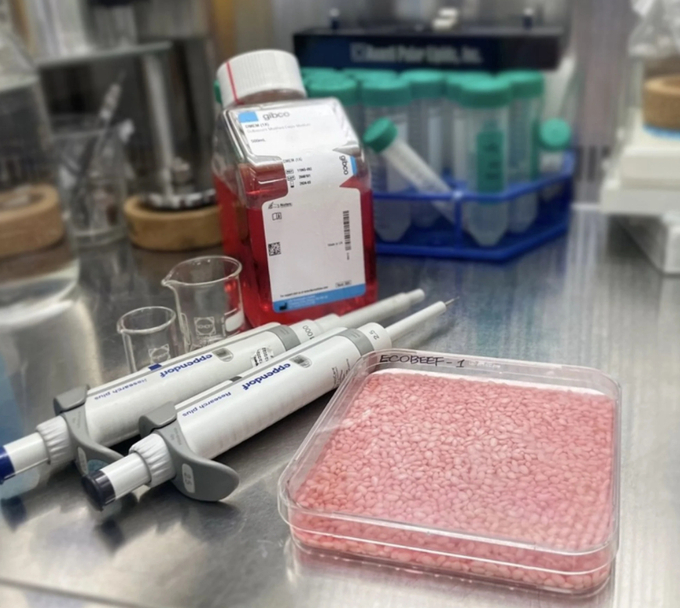May 30, 2025 | 05:26 GMT +7
May 30, 2025 | 05:26 GMT +7
Hotline: 0913.378.918
May 30, 2025 | 05:26 GMT +7
Hotline: 0913.378.918

The meat-rice hybrid is an alternative protein source that has a much lower carbon footprint than normal beef. Photo: SCMPOST
The new grain was grown in a lab by researchers at Seoul’s Yonsei University and is packed with beef muscle and fat cells.
The result is a pink rice that the team says could offer a cheaper and more environmentally sustainable meat alternative and leave a smaller carbon footprint.
“Imagine obtaining all the nutrients we need from cell-cultured protein rice,” said Park So-hyeon, who co-authored the study.
“Rice already has a high nutrient level, but adding cells from livestock can further boost it,” she said in a press release on Wednesday, when the study was published in the Matter journal.
The grain was coated in fish gelatin to help beef cells latch onto the rice, and then left to culture in a Petri dish for up to 11 days.
The final product contained 8 per cent more protein and 7 per cent more fat than regular rice, the team said, and was more firm and brittle than natural grains.
The latest creation left a significantly smaller carbon footprint since the production method eliminates the need to raise and farm animals, which consume “a lot of resources and water and releases a lot of greenhouse gas,” Park said.
For every 100g (3.5 ounces) of protein produced, hybrid rice is estimated to release under 6.27 kilograms of carbon dioxide, while beef production releases eight times more, according to the press release.
If commercialised, it would provide a much cheaper option for consumers in Korea, where the hybrid rice is estimated to cost around US$2.23 per kilo, while beef costs around US$15.
The team plans to further develop the process before the rice goes on the market so that the cells can grow better in the rice grain for more nutritional value.
“Now I see a world of possibilities for this grain-based hybrid food,” said Park.
“It could one day serve as food relief for famine, military ration, or even space food.”
(SCMP)

(VAN) Vikas Rambal has quietly built a $5 billion business empire in manufacturing, property and solar, and catapulted onto the Rich List.

(VAN) Available cropland now at less than five percent, according to latest geospatial assessment from FAO and UNOSAT.

(VAN) Alt Carbon has raised $12 million in a seed round as it plans to scale its carbon dioxide removal work in the South Asian nation.

(VAN) Attempts to bring down the price of the Japanese staple have had little effect amid a cost-of-living crisis.

(VAN) Fourth most important food crop in peril as Latin America and Caribbean suffer from slow-onset climate disaster.

(VAN) Shifting market dynamics and the noise around new legislation has propelled Trouw Nutrition’s research around early life nutrition in poultry. Today, it continues to be a key area of research.

(VAN) India is concerned about its food security and the livelihoods of its farmers if more US food imports are allowed.